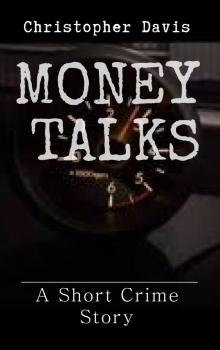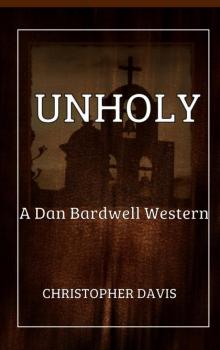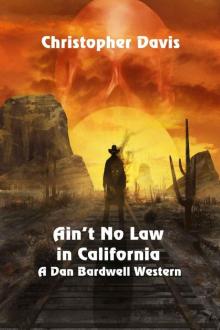- Home
- Christopher Davis
The Conduct of Saints Page 6
The Conduct of Saints Read online
Page 6
The priest had removed his glasses—it was no longer light enough to read—and appeared to watch a crow swaying at the top of the old cypress in the center of the garden. He had been energetic, jumping from the bench to look out through the break in the wall at the traffic or the begging children, pacing a few steps on the path towards the monastery’s offices, talking in his rapid, impatient, hoarse voice. Now he sat still, as if bound, and looked up at the glossy bird on its high perch. The creature and the upper part of the great tree shone in the sun, while the two men below had all but disappeared from each other’s sight in shadow. Presently, the bird, a carrion crow, opened its wings and flew off calling. It was answered by another bird, then a third farther away. Alessandro saw that the man’s eyes were wide, as if what he saw had moved him.
◂ 5 ▸
THE DRAWINGS and writings on Vittorio’s skin: the names of places in which he had lived and prisons in which he had served time, the names of friends and lovers, evil words, Bible verses, God’s name, crude representations of nude men and women, of the crucified Christ, of angels, Charlie Chaplin in his bowler hat, Ramon Navarro on a horse; crosses, pistols, knives, snakes, lions, anchors, birds, flowers, stars in the palms of his hands, on the soles of his feet, amore, one letter on each toe, chains across his knuckles, a tree of life with its twelve separate fruits at the base of his spine, roots spreading over his buttocks; a serpent spiraling the axis of his penis: nothing on his face because it was so beautiful, he had told Alessandro, it required nothing more.
BOTH PRIESTS and reporters turned what people said to their purpose, so that then as now there were things Alessandro did not talk about. He knew that the young man who had killed Marietta lived in him, as the priest Doherty had let him know he understood. Sometimes it was no more than a seven-month-old child kicking, sometimes a grown man sleeping. The doctor who evaluated him on his arrival at the prison in Noto had said that Alessandro was neither a natural criminal nor of a low evolutionary type, as so many of the prisoners were, but an intelligent fellow aware of free choice, a criminal by chance, by passion. Seeing that the doctor cared nothing for the victims of crimes but only for science, Alessandro denied it. He was a criminal by choice as well as by nature, he declared. If there was good in him, he told the doctor, it was a trick of the devil’s to persuade people to trust him when they should not.
He lay wrapped in the G.I. blanket looking out above the half door of the gardening shed at the moon, now full, which made a yellow glow behind a covering of cloud. A night bird called until midnight and stopped, as if it had been given what it asked for. The thing in him kicked: “Still here,” it said. The penitent slept near dawn and had another dream, this one of a room without doors or windows, without shadow or light. He was neither inside it, nor outside of it observing. The room had its existence beyond the dream.
◂ 6 ▸
IT WAS on the fourth or fifth visit—Alessandro had lost track—that the priest returned to the question of memory:
“Here’s the police report Padre Mauro obtained. It emphasizes the fact that there was a great deal of blood spilled. I want to know if you remember the blood. I mean when you came to yourself. The family ran in from the yard and from the threshing room floor. Some neighbors, hearing her screams, came running. The police came. You were found covered in blood, the bloody hook in your hand, the child lying in agony. You remember that, do you—the blood that came from those fourteen wounds?”
“There was a great deal of blood, Monsignore.”
“Yes, but now think. Was the child’s blood warm?”
Alessandro did not reply.
“Hot as it spurted, then warm, then cold on your clothing when the carabinieri were dragging you handcuffed to Cisterna behind their horses. Then dry and stiff.”
Alessandro was silent.
Brendan said, “Let’s go back. You say you don’t remember inflicting the wounds that produced the blood. But you saw the blood and said, I imagine, ‘What have I done?’ Is that right?”
“I don’t remember the act or thinking that, but I knew what I had done.”
“They told you. The police and the carabinieri.”
“It was evident.”
“Do you remember anything of that morning?”
“Nothing until the police came. Not of that morning or the night before. The last thing I remember is the morning of the day before, getting ready to go out to the bean field. I sharpened the tools, my father’s tools they were, the scythe, the sickle, and the hook, the murder weapon.”
“Nothing else.”
“Nothing. Until the authorities came.”
“And you were glad the police came—to be found out, to be stopped from killing the others that morning: Marietta’s mother, your own father—glad to have the police there.”
Alessandro said, “I wouldn’t have hurt them. It was only Marietta, and that was love turned inside out, made evil. They asked if I was sorry for what I’d done, and I said I wasn’t. They said it would go better for me if I said I was, but I wasn’t, and I didn’t say it. I was sorry only after I saw Marietta in a vision in the prison at Noto when she came to me in my cell. I wasn’t sorry when I did it, and I wouldn’t speak to the police. Evil was in me. I hated the police. I hated every kind of authority. I was an anarchist like Raskolnikov.”
“Your older brother was psychotic,” Brendan said. “What people call crazy.”
“I know the word.”
“I’ve asked before. Do you hear voices? I mean when you’re awake and no one is present and speaking.”
“I heard Maria’s voice one time. That’s all.”
“Your mother was ill with a mental disorder.”
“Yes. Schizophrenia.”
“Did she hear voices?”
“Yes.”
“And your brother was similarly afflicted.”
“Yes. I don’t know if he heard voices. Speaking for myself, I’ve heard only Marietta in the way you mean. Also, I now recall that when I came to myself and found the saint’s blood on my hands, it was still warm. I remember that. I don’t remember about the stiffness of the shirt.”
“When you came to yourself. Let’s pinpoint that. Did you have an erection?”
“My trousers were wet, not only with blood.”
“And?”
“Nothing. I recall nothing else.”
“And visions, as opposed to dreams. Do you have them now?”
“Only dreams. Now, after many years and only since coming to Rome, I have dreams again. They come fast—pictures like a camera makes.”
“Snapshots,” the priest said in English and translated it.
“Snapshots.”
Brendan said, “I wonder if now you would be willing to describe the vision you experienced in prison. At this moment.”
“I’ve done so. It’s in the statements.”
“In the record, yes. I think those statements are false.”
“May I have permission not to respond?”
“You don’t need permission, brother. This isn’t a court of law.”
◂ 7 ▸
THE VATICAN priest smelled of wine and tobacco when he came to him. He would put his red face into his, so that Alessandro could not help but smell him. Of all the small matters of everyday living, the redeemed murderer found intimacy the hardest to bear. He had suffered from the intimacy of prison for years and could not now easily live in company with others, except in the open air—working in the fields at Ascoli among his brothers, or here, outside in the monastery garden. He needed to sleep alone, work alone. He prayed in solitude, and solitude was woven into his prayer. His surrender was to solitude and silence. The Capuchin brothers at Ascoli respected this, were most of them more or less the same as he. He understood that intimacies on the part of this priest must be accepted as a test of his, Alessandro’s, forbearance—the close body, the close, intimate questions—so he bore them without even inner complaint. He had endured a dozen interrogations. He had supposed it was finally over but accepted the fact that it was not. He had hoped by now to have only his work to do—to serve, be silent, and wait to be called to God.
There were no more than fifteen friars living in the monastery where he was now a guest. A lay brother had come from Naples two years before and brought with him from the epidemic there body lice infected with typhus. The disease killed several of the monks, including the man from Naples. A number fled to escape the contagion. The few remaining were those who had been longest in residence. Listening at the chapel door, Alessandro heard their old voices recite the vow of Saint Francis—to be chaste, to live in poverty, to love God, to be obedient in all things to the Church—and inwardly repeated the words. He had added rules of his own: to be silent, to curb thought, to be apart.
He knew this last was seen by the Church as a demonstration of the pride of self—a deliberate disconnection from other believers—and he had been corrected for it. When that happened, knowing he deserved the admonition, he tried to do as he was asked, but never succeeded for long. Soon, he would be apart once more, eavesdropping, sitting on the bench in the corridor outside of the chapel at Ascoli. Again, here at Rome, he let the chanting voices drop their words one by one into the pool of his mind. He did not join his voice to theirs. It had been the same for decades. Wherever he attended mass, he would sit in the back of the church in a corner close by one of the side chapels or behind a column. When he took communion, he came forward only when the others had finished and gone away. Here in this cloister he did the same. Father Zecca did not admonish him but waited patiently at the altar, smiling. In the dining hall he sat with the rest as they ate, listened attentively to the eldest monk recite prayers from his stall above them, but did not speak when the reading was over unless he was addressed, and then briefly.
He was told the Superior had asked for him.
He picked up the heavy rose gauntlets, nippers, rolled-up leather apron, and cap from the bench under the olive tree, returned them to the shed, went down the stone-floored corridor, across the farther court, tapped on the door of the office, and entered.
“It escapes me for the moment—the thing I was about to say to you.” Father Zecca was more than eighty, frail as a bird, eyes filmed with cataracts, a slight tremor making the bald head nod as if in consent or approval.
“If it concerns me, I’m getting on well,” Alessandro said.
“It was something else.”
“I hope to be able to return to Ascoli soon, my lord. After this deposition.”
“We shall miss you. Miss you. Here! It’s because they were hiding under L’Osservatore, and I couldn’t see them.”
It was a collection of papers of different sizes held together by a pin.
“These are from our sister house on Via Pietrasanta. You’ll find the names of the nuns written at the bottom of each note in pencil. They beg you to sign them, addressing each personally as indicated, and perhaps add some word of faith, and also put the date. I believe today is the twenty-seventh of May.”
Alessandro took the papers.
Zecca said, “How about that fellow who questions you? What sort of man is he?”
“He thinks I’m a liar.”
The old bishop shook his head. “The world supposes everyone lies but itself. Say to him what you know to be true, and let him learn to hear.” And then: “The journalists who come along every morning—I don’t know how they found you in this place. Perhaps the Vatican fellow told them. They also think everyone tells lies. Never mind. I send word that you won’t see them, though I have no authority to order them away.”
Zecca asked, “May I have your blessing?”
“The grace of our Lord Jesus Christ be with you,” Alessandro said. “Now and forever.”
◂ 8 ▸
FROM TIME to time during his first days as a guest at the monastery, one or another of the reporters would happen on the opening in the wall, as the priest had done, and, if Alessandro was to be seen, call out to him. One had returned several times. “Two minutes only, Maestro, no more.” He addressed him as Sant’Alessandro Martire.” He pushed a business card through the opening, a sum of money written on it. Whenever a journalist appeared, Alessandro retreated to the shed and did not emerge until he was certain he was gone. He took the cards and notes to the kitchen and disposed of them in the fire. Accustomed to such things, to reporters and their manners, he did not trouble Father Zecca about them. After a time, finding it hopeless, they did not return.
◂ 9 ▸
RACHELE THRUST her dirty hand palm up through a gap in the timbers, the wrist limp to demonstrate its owner’s weakness, her face a theatrical mask of suffering. She leaned her body against the timbers that blocked the gap to let Alessandro look her over. She was small for her age, which he took to be about thirteen. The raveled coat-sweater, which was too large for her and fell to the hem of her little skirt, her black, waist-length hair, made her seem smaller yet. Her feet were naked, filthy from the street, legs streaked white where she had tried to wash, but her face was clean—a creamy brown, smooth and narrow. She had beckoned to him as he was packing up his tools.
A boy mingled with the rest on this afternoon. He was older, fifteen perhaps, Rachele’s brother by the look of him, as thin as she was but strong in appearance, an inch or two taller. His shirt was unbuttoned, and Alessandro could see a wooden cross on a leather string hanging against his bony chest, and with it on the same string a pagan charm, a pair of bull’s horns cut out of tin. He stood behind Rachele and said over her shoulder, “I know who you are, Grandpa.”
“Who do you think I am?”
Rachele said, “You raped Santa Maria Goretti and killed her.”
“Why don’t you give her money?” the boy asked, indicating Rachele.
“What’s your name?”
“Ulli. Give her some money.”
“I don’t have any, Ulli.”
It was not quite true. He had enough for the return fare to Ascoli when the deposition was complete.
The boy said, “Do you want her? She could manage even with this obstruction between you. She’ll come back tonight. Tell her what time, and she’ll be here. Eleven? Later? It’s normal. What are you worried about?”
Alessandro did not reply.
The boy said stupidly, “You’ll have to give us money first, though.”
“Christ help you.”
“Do you prefer boys? Am I too ugly for an important man like you?”
IT HAD begun to rain. He went into the kitchen with its bottles of oil in wicker frames, two or three cheeses hanging from the rafters, garlic in strings, a few potatoes and onions in straw beds, most of them sprouted, lentils, beans, flour. Even with the help of the American Army, there was little enough. He searched in the garbage for discarded scraps, the butt-end of a salami, scrapings of the dough used to make pasta. He asked the lay brother cook for permission to take what he had found, wrapped it in newspaper, twisted it closed, went out, intending to pass it through the broken wall to Rachele and the boy he had taken for her brother, and found they had left, driven away, he supposed, by the rain.
At four-thirty, Alessandro watched the students come out of the school on the other side of the street, shouting at the weather, covering their heads with sweaters or satchels, running in every direction. A different nun, elderly, heavy, stood under an umbrella at the top of the steps to observe them. She wore a gray habit and black sandals, kept a hand on the silver cross on her breast. He thought he had seen her before. The last of the children gone, as if Alessandro’s fame had finally reached her, she turned to where he stood at the break in the wall and held his gaze across the wet cobbles.
FOUR
PIETRO KOCH
◂ 1 ▸
He could hear them from their new gathering place at the principal gate on the Via della Lungara. The officers must have moved them from the visitors’ entrance around the corner. There were only a few in the morning, women from the sound of the shouting voices. The men were working or looking for work.
“Justice for our murdered brothers and sons!”—that kind of thing.
In the evening the men came along, traffic was hampered, the mob voice changed, deepened, grew more threatening, and the demonstration turned into a serious matter. Then it was “Koch assassino! Faccia di merda! Faccia di stronzo! ”—the vulgarity of the lower class never failing to amaze him. “Leccacazzi!”—penis-licker. They shouted aloud the word “shit” in the streets of the Eternal City.
Communists, Jews: thugs and criminals with private grievances and nothing better to do. A mob, in short.
Carretta, the one the mob had lynched eight months before, had been director of the Regina Coeli, the prison where Pietro was now kept. Carretta had been a witness for the prosecution in the trial against the Fascist Caruso. The mob had taken him from the Palace of Justice and beaten him. He ran, and they dragged him from the car in which carabinieri were trying to drive him to safety, beat him again, agitators screaming for blood, as members of the Control Commission—Americans, British—watched from their command cars and Jeeps, doing nothing. They hauled him half-conscious to the Umberto bridge and dropped him thirty feet into the Tiber, where the cold water revived him, and where men in rowboats, instead of attempting to aid him, struck him with their oars as he floated, still alive, downstream toward the Angelo bridge, pursued by the boats, and beaten, until, under the Angelo, the terrified creature finally died. There the battered body was pulled ashore, dragged back to the Coeli, and strung up with a rope (an item hard to find in a city with nothing to buy and nothing to sell), head down like Saint Peter, from the bars of a window, for the people to gape at and spit at.
And that was the wrong man.
The one who instigated the agitation, never identified, had mistaken Carretta for Caruso, the man on trial. Carretta had been one of their own, a nominal Fascist but a Resistance sympathizer who had despised the Nazi occupiers. The Roman mob had changed in no respect from the time of Caesar’s assassination—or anyway Shakespeare’s representation of the event—when it lynched a poet, mistaking him for a conspirator who had the same name.

 Money Talks
Money Talks Vicky's Secret
Vicky's Secret Unholy
Unholy Ain't No Law in California
Ain't No Law in California